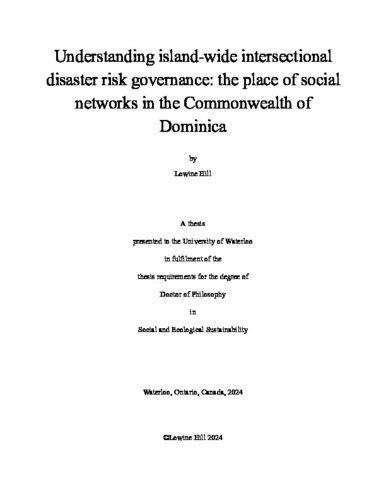| dc.description.abstract | The Sendai Framework for Disaster Risk Reduction promotes deliberative, inclusive and bottom-up processes to disaster risk reduction. Further, the growing focus on stakeholder engagement within disaster risk governance approaches provides greater voice to the “governed” within disaster risk policy making process. However, the “governed” are often grouped in generic categories such as “women”, “youth” and “persons with disabilities”, without taking in consideration the intersecting identities and related vulnerabilities of these groups. Further, current policy and practice within disaster risk reduction provides limited situational specificity to governance processes, and specifically the diversity of the actors involved, beyond their essentialized identities. This research sought to generate an intersectional, place-based disaster risk governance framework, develop insights on intersectional governance opportunities (or barriers) through the understanding of trust and social networks, and to foster transferable lessons for similar small islands. Intersectionality theory provides a comprehensive way of understanding and analysing social-ecological characteristics, inequalities and power dynamics within disaster risk governance settings beyond the emphasis on gender and entitlements.
This thesis proposes a pivot in disaster risk governance research and practice and aims to understand how social networks influence the development and effectiveness of island-wide, intersectional disaster risk governance in Dominica and Caribbean small islands. The research was framed through three interdependent specific objectives:
1. To develop an integrated framework for the consideration of intersectionality in place-based disaster risk governance in islands (theoretical objective).
2. To reposition disaster risk governance within an island-wide, intersectional approach through the analysis of actor identities within their social networks (empirical objective).
3. To identify intersectional opportunities to strengthen existing governance processes and achieve better disaster risk reduction outcomes (applied objective).
Using a mixed methods approach, a number of key insights emerged. First, this research expanded the Disaster Risk Governance theory to highlight the place- and context-based nature of human identities by incorporating elements of intersectionality and place-based thinking (chapter 2). This framework proposed six (6) key principles support inclusive and contextualised actions. These principles were based upon a synthesis of the literature and examples from small islands. This manuscript examined how an intersectional perspective can generate pathways to address the root causes of vulnerabilities to disasters beyond the “one size fits all” approaches promoted globally. Second, using an in-depth case study situated on the island of Dominica and focusing on the experience of gender and sexual minorities, this research presented some insights on intersectional disaster governance opportunities (or barriers) through the understanding of trust and marginalisation within social networks (chapter 3). This manuscript undertook a practical reflection formulated through four main themes: (i) navigating identities (ii) victimisation and vulnerability; (iii) the importance of place and scale and (iv) how power defines access and agency. Finally, this research had a wider look at the governance networks and actors, as well as their formal and informal characteristics occurring in Dominica (chapter 4). This manuscript explored the structural and functional elements of disaster risk governance (DRG) networks in Dominica and examined the impact of actors’ identities on information sharing dynamics. Through this analysis, this research reflected on the value of identities in enabling and/or hindering intersectional risk reduction opportunities on the island. The insights emerging from this research have the potential to highlight information sharing patterns, network structural gaps, clusters and key information brokers present within DRG networks. This research marks an initial step toward comprehending how actors’ identities involved in networks can shape social relationships across scales and can further support the examination of disparities within these DRG networks. Here, intersectionality can help in uncovering structural barriers, identifying information bottlenecks, and highlighting disparities in information access, all of which can impact individuals with specific combinations of identities, but more widely whose values and knowledge are represented and shared as well as the scope and scale of their power and agency in supporting risk reduction outcomes. | en |

